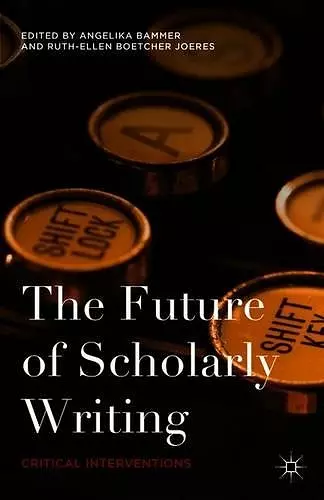The Future of Scholarly Writing
Critical Interventions
Angelika Bammer editor Ruth-Ellen Boetcher Joeres editor
Format:Paperback
Publisher:Palgrave Macmillan
Published:5th Oct '15
Currently unavailable, and unfortunately no date known when it will be back

'Bammer and Boetcher Joeres have thrown a party and invited all the coolest people. The result is an inspiring and forward-looking book that urges scholars in the humanities and social sciences to reimagine the staid conventions of academic discourse and to approach the challenges of scholarly writing in a spirit of poetry, playfulness, and joy.' Helen Sword, Professor and Director of Centre for Learning and Research in Higher Education (CLeaR), The University of Auckland, New Zealand and author of Stylish Academic Writing "This is a wonderful book, from beginning to end. By turns funny and serious, personal and professional, its ideas and its practices of writing slyly and lovingly reshape ideas about what scholarly writers do, and what they might do if they were free." - Eric Hayot, Professor of Comparative Literature, Pennsylvania State University, USA "Bammer and Boetcher Joeres have thrown a party and invited all the coolest people. The result is an inspiring and forward-looking book that urges scholars in the humanities and social sciences to reimagine the staid conventions of academic discourse and to approach the challenges of scholarly writing in a spirit of poetry, playfulness, and joy." Helen Sword, Professor and Director of Centre for Learning and Research in Higher Education (CLeaR), The University of Auckland, New Zealand 'This is a wonderful book, from beginning to end. By turns funny and serious, personal and professional, its ideas and its practices of writing slyly and lovingly reshape ideas about what scholarly writers do, and what they might do if they were free.' Eric Hayot, Professor of Comparative Literature, Pennsylvania State University, USA and the author of The Elements of Academic Style "This is a profoundly important book. As universities face multiple crises, from corporatization on the inside to charges of irrelevance from the outside, it is essential that scholars give as much attention to how they write as to what they write. Scholarship, especially in the humanities, is at risk of becoming meaningless unless we can communicate what is important about our work to a wide range of readers inside and outside the academy. The contributors to this volume provide many worthwhile paths to guide academic writing into the future." - Elaine Tyler May, Professor of American Studies and History, University of Minnesota, USA and author of America and the Pill: A History of Promise, Peril, and Liberation
This stimulating collection is the first to take on the issue of form and what it means to the future of scholarly writing. A wide range of distinguished scholars from fields including law, literature, and anthropology shed light on the ways scholars can write for different publics and still adhere to the standards of quality scholarship.This stimulating collection is the first to take on the issue of form and what it means to the future of scholarly writing. A wide range of distinguished scholars from fields including law, literature, and anthropology shed light on the ways scholars can write for different publics and still adhere to the standards of quality scholarship.
“Representing disciplines across the humanities and social and natural sciences … the contributors acknowledge the importance of scholarly norms and discuss tensions between compliance and what writers want to say, how they want to say it, audience expectations, and intended outcomes. In addition, the authors explain how they challenge these norms and call for legitimate space to successfully convey the message. … Summing Up: Recommended. Upper-division undergraduates and above.” (D. Truty, Choice, Vol. 54 (3), November, 2016)
“This book offers ways to move onward and forward, into the future of academic writing, of writing and thinking in general, and of the kind of work we aim to do as politically engaged intellectuals, scholars, and writers. … While it is a book about academic writing, it is also very much an academic book and an example of scholarship at its best: it is politically engaged, it inspires, and it calls for further inquiry.” (Maria Stehle, Women in German, 2016)
ISBN: 9781137520531
Dimensions: unknown
Weight: 3985g
251 pages
1st ed. 2015